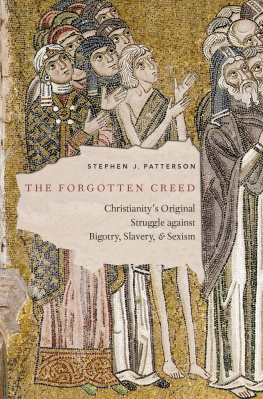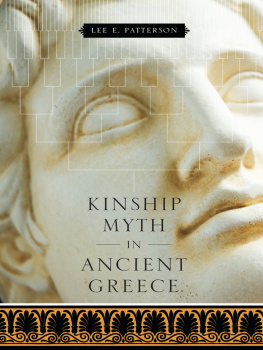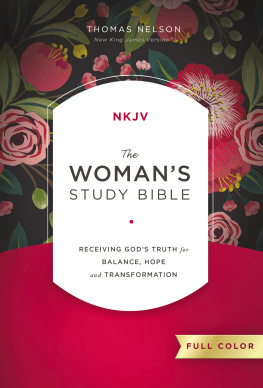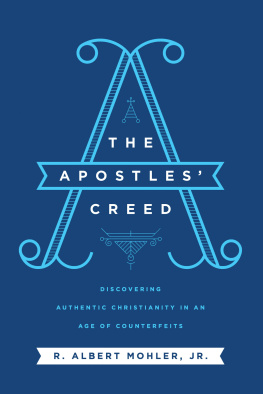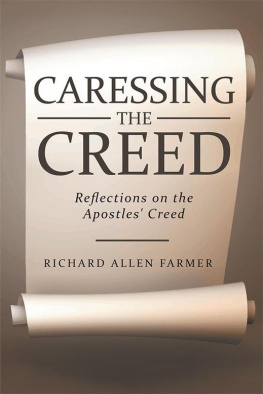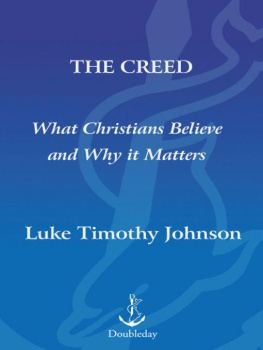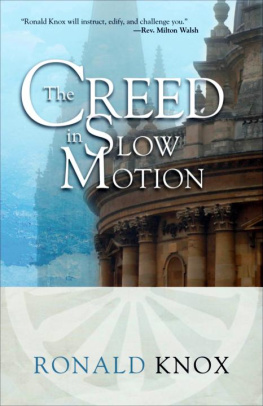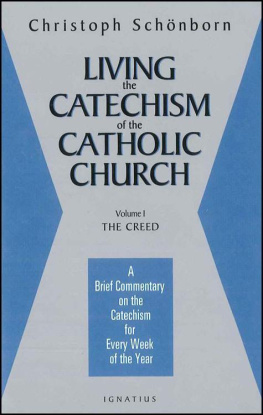The Forgotten Creed

Oxford University Press is a department of the University of Oxford. It furthers the Universitys objective of excellence in research, scholarship, and education by publishing worldwide. Oxford is a registered trade mark of Oxford University Press in the UK and certain other countries.
Published in the United States of America by Oxford University Press
198 Madison Avenue, New York, NY 10016, United States of America.
Oxford University Press 2018
All rights reserved. No part of this publication may be reproduced, stored in a retrieval system, or transmitted, in any form or by any means, without the prior permission in writing of Oxford University Press, or as expressly permitted by law, by license, or under terms agreed with the appropriate reproduction rights organization. Inquiries concerning reproduction outside the scope of the above should be sent to the Rights Department, Oxford University Press, at the address above.
You must not circulate this work in any other form and you must impose this same condition on any acquirer.
Library of Congress Cataloging-in-Publication Data
Names: Patterson, Stephen J., 1957 author.
Title: The forgotten creed : Christianitys original struggle against
bigotry, slavery, and sexism / Stephen J. Patterson.
Description: New York, NY : Oxford University Press, 2018. |
Includes bibliographical references and index.
Identifiers: LCCN 2017050017 | ISBN 9780190865825 (hardcover : alk. paper) |
ISBN 9780190865849 (epub) | ISBN 9780190879037 (oso)
Subjects: LCSH: Bible. Galatians, III, 28Criticism, interpretation, etc. |
Identity (Psychology)Religious aspectsChristianityBiblical teaching. |
Identification (Religion)Biblical teaching. | EqualityReligious aspects
ChristianityBiblical teaching.
Classification: LCC BS2685.52.P38 2018 | DDC 227/.406dc23
LC record available at https://lccn.loc.gov/2017050017
For you are all children of God in the Spirit.
There is no Jew or Greek;
There is no slave or free;
There is no male and female.
For you are all one in the Spirit.
The First Creed
They called me everything but a child of God.
Curt Flood
On playing in the Carolina League as a black ballplayer in 1957
Contents
On a warm, June Sunday in St. Louis I wandered with an old friend through the church where, earlier that morning, my children had been baptized. We came to the baptismal font, around which our family had gathered for the ceremony during the regular Sunday service. It was about four feet high, just low enough for my daughter to reach up and fiddle her fingers in the water and watch the droplets dribble back into its shallow pool. My friend, who had grown up in a secular upper-class home in Titos Yugoslavia, had little knowledge of fonts and baptism and the goings-on that morning. So he asked, what does it mean, baptism?
The question gave me pause. When you baptize a baby, it is a kind of naming ceremony, like those found in many societies. When you are baptized, like I was, on the eve of puberty, it is a coming-of-age ceremony, a rite de passageagain, a common practice across cultures. Sometimes, though rarely, an adult is baptized. Then it signals a religious conversion, the culmination of a profound personal transformation. I rambled. But what do you think it means? he asked. It was a fair question. I had just seen my own children baptized.
It means, I said, youre a child of God. So youre saved? No. Thats not what I meant. That is what most people assume it means. That is what most people think the Christian religion is all about: salvation. But that is not really it. Earlier that morning the minister had used words from an ancient, nearly forgotten credo once associated with baptism. You are children of God, she said. There is no Jew or Greek, no slave or free, no male and female. The words were from a letter of Paul the Apostle, who had taken them, in turn, from an ancient baptismal creed he had come to know through the Jesus movement. That is what its aboutbeing a child of God. Ethnicity (no Jew or Greek), class (no slave or free), and gender (no male and female) count neither for you nor against you. We are all children of God. He was skeptical. An early Christian creed about race, class, and gender? Unbelievable.
Why not be skeptical? What has Christianity ever had to say about race, class, and gender? I suspect that most people would think nothing good. Sunday morning is still the most segregated hour in American life. From the time African slaves first began to convert to the religion of their masters, whites prohibited blacks from worshipping with themstill true in most American churches until after the civil rights era. Then, in the 1960s, white churches began to open their doors to African Americans andsurprisemost blacks said thanks, but no thanks. This wasnt major league baseball, after all. Most African Americans preferred to worship in the churches their ancestors had built of necessity, theirs, now, by choice, rather than join churches that had shunned them for more than a century. The story of race and religion in America is pocked with indignities large and small. So, while police departments, public schools, restaurants, the United States military, and baseball have all become racially integrated, Americas churches have not. It may be that the church is the last truly segregated public space in America.
How about class? Does Christianity have anything helpful to say about class? Perhaps. You might hear blessed are the poor on any given Sunday, but more likely you will hear blessed are the poor in spirit. The words of Jesus are assumed to be about your spiritual life, not your financesunless, of course, you attend one of the larger, far more successful churches where the prosperity gospel is preached, where the word is always about your finances. If you believe, keep the right company, straighten out your life, and tithe, you will prosper. The millionaire preaching these words to you is a witness to his own truth. The faithful definitely will prosper. And what of those who do not? Well, anyone can read those tealeaves. In todays fastest-growing churches, the gospel is all about class.
And gender? Simply put, the church is the last, greatest bastion of gender bias in American society. The Catholic Church does not ordain women as priests and probably never will. Neither do the Orthodox churches. The largest Protestant denominations do not ordain women as ministers, nor do most of the historically black churches. Only the small denominations once known as the mainline churches ordain womenand these are the churches that are in decline. My own United Church of Christ, the oldest church in the United States, which ordained the first woman minister in the mid-nineteenth century, now has fewer than a million members. Today the Mormons outnumber the church of the Pilgrims seven to oneand the Mormons are not ordaining any women. The church is the last institution in America where it is still legal to discriminate on the basis of gender.
So, an ancient Christian credo declaring solidarity across ethnic lines, class division, and gender difference sounded a little unbelievable to someone who had come to see the Christian church as more a symbol of social ills than of starry-eyed utopian dreams. And that these words could have come from the Apostle Paulto anyone with a passing familiarity with Christianitywould have seemed more incredible still. Most people today assume that Paul is the father of Christian anti-Semitism, was profoundly misogynistic, and was authoritarian when it came to slavery. Let wives be submissive and slaves be obedient, he taught. Or so they think. And why not? Clear statements to that effect appear in the New Testament letters claiming the great apostles authorshipColossians, Ephesians, 1 Timothy, and Titus. But every beginning student of the Bible learns that these letters are pseudonymous, forgeries. Paul did not write them. On the other hand, Paul himself did indeed write the Epistle to the Galatians, including the remarkable words of Galatians 3: 2628:

